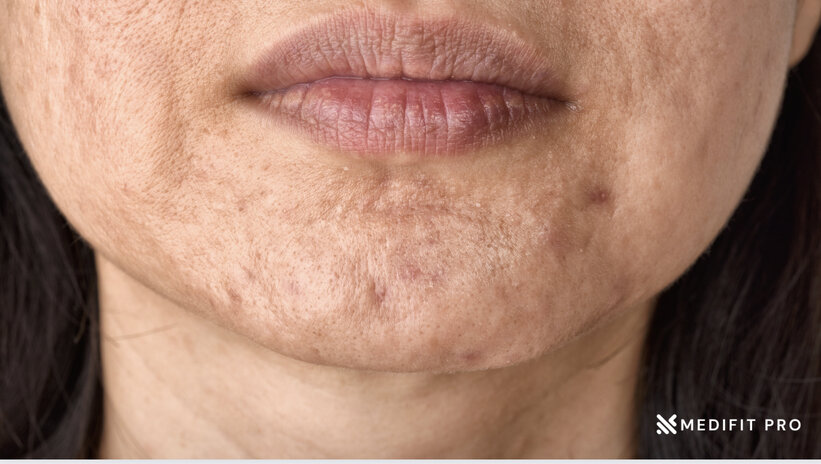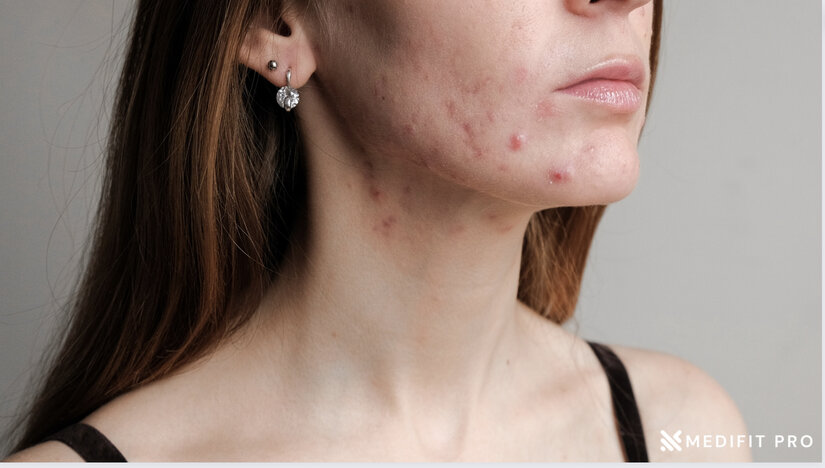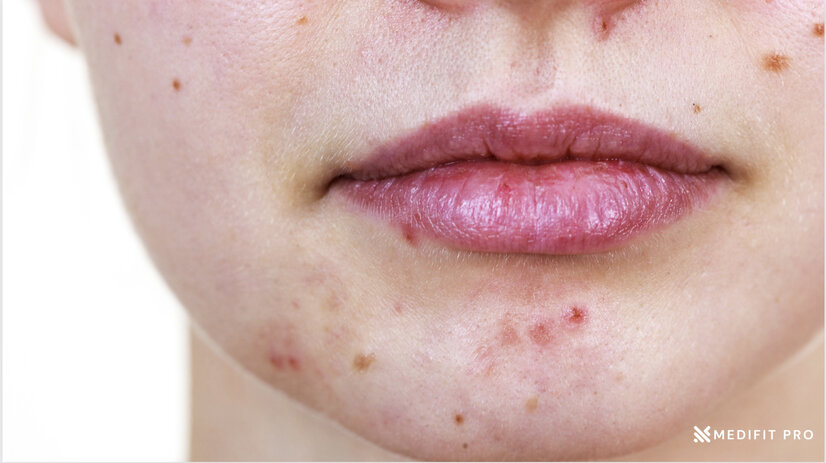Are you an adult female struggling with acne? You’re not alone. Adult female acne is a common skin condition that affects many women, and can be frustrating and embarrassing to deal with. But what exactly is adult female acne, and how is it different from the acne you may have experienced during adolescence?
Adult female acne is defined as acne that appears in women over the age of 25. While adolescent acne is typically characterized by oily skin and the appearance of blackheads and whiteheads, adult female acne often presents as deep, painful cysts and nodules on the chin and jawline. This type of acne can also be accompanied by inflammation and redness.
In fact, statistics show that adult female acne is more common than you might think. According to a study published in the Journal of Women’s Health, up to 50% of women experience acne during adulthood. So, if you’re struggling with adult female acne, know that you’re not alone, and there are effective treatments available to help you achieve clear, healthy skin.
II. Causes of Adult Female Acne
Adult female acne is caused by a variety of factors, including hormonal imbalances, genetics, stress, and lifestyle choices. Understanding the underlying causes of your acne can help you determine the best course of treatment.
Hormonal Imbalances and Fluctuations:
One of the most common causes of adult female acne is hormonal imbalances and fluctuations. Changes in hormone levels, such as those that occur during menstruation, pregnancy, and menopause, can trigger acne breakouts. This is because hormones like testosterone can stimulate the production of oil in the skin, which can clog pores and lead to the formation of acne.
Genetics:
Genetics also play a role in the development of adult female acne. If your parents or siblings have a history of acne, you may be more likely to experience it yourself. Studies have identified certain genes that may be linked to acne development, although more research is needed to fully understand the genetic factors at play.
Stress:
Stress can also contribute to the development of adult female acne. When you’re stressed, your body produces more cortisol, a hormone that can stimulate oil production in the skin. This can lead to clogged pores and acne breakouts. Additionally, stress can weaken your immune system, making it more difficult for your body to fight off acne-causing bacteria.
Dietary Factors and Lifestyle Choices:
Dietary factors and lifestyle choices can also play a role in the development of adult female acne. Diets high in refined sugars and carbohydrates, as well as dairy products, have been linked to an increased risk of acne. Similarly, smoking, alcohol consumption, and a lack of exercise can also contribute to the development of acne. Making healthy lifestyle choices and maintaining a balanced diet can help reduce your risk of acne breakouts.
III. Symptoms of Adult Female Acne
Adult female acne can present in a variety of ways, but typically manifests as breakouts on the face, neck, and chest. Understanding the different types of acne and their symptoms can help you determine the best course of treatment.
Appearance of Acne on Adult Female Skin:
Acne on adult female skin can appear as blackheads, whiteheads, papules, pustules, nodules, and cysts. Blackheads and whiteheads are non-inflammatory types of acne and form when a hair follicle becomes clogged with oil and dead skin cells. Papules and pustules, on the other hand, are inflammatory types of acne that form when the hair follicle becomes inflamed, leading to redness and swelling. Nodules and cysts are the most severe types of acne, and can be painful and deep beneath the skin.
Difference between Inflammatory and Non-Inflammatory Acne:
It’s important to understand the difference between inflammatory and non-inflammatory acne, as the treatment approach may differ depending on the type of acne. Non-inflammatory acne, such as blackheads and whiteheads, can often be treated with topical retinoids or exfoliating treatments. Inflammatory acne, on the other hand, may require more aggressive treatment, such as oral antibiotics or hormonal therapy.
Potential Scarring or Hyperpigmentation:
If left untreated or improperly treated, adult female acne can also lead to scarring or hyperpigmentation. Scarring occurs when the skin is damaged by inflammation, while hyperpigmentation can result from the body’s natural response to the inflammation. It’s important to seek treatment for acne early on to prevent scarring and hyperpigmentation.

IV. Diagnosis and Treatment
Diagnosing adult female acne is typically done through a physical examination of the skin, as well as a discussion of medical history and any medications or products being used. Once a diagnosis has been made, a variety of treatment options are available.
Diagnosing Adult Female Acne:
A dermatologist or healthcare provider can diagnose adult female acne through a physical examination of the skin. They may also discuss your medical history, including any medications or products you are using. In some cases, they may order blood tests to check for hormonal imbalances.
Treatment Options:
There are several treatment options available for adult female acne, including:
Topical Medications:
Topical medications, such as retinoids, benzoyl peroxide, and salicylic acid, can be effective in treating non-inflammatory acne. These medications work by unclogging pores and reducing inflammation. They may be prescribed in combination with other medications for more severe cases of acne.
Oral Medications:
Oral medications, such as antibiotics, hormonal therapy, and isotretinoin, may be prescribed for more severe cases of acne. Antibiotics work by reducing inflammation and killing bacteria, while hormonal therapy can regulate hormone levels to reduce the production of oil in the skin. Isotretinoin is a powerful medication that is reserved for the most severe cases of acne, as it can have significant side effects.
Lifestyle Changes:
In addition to medication, lifestyle changes can also be effective in treating adult female acne. Eating a balanced diet, getting regular exercise, reducing stress, and avoiding harsh skincare products can all help reduce the frequency and severity of acne breakouts.
Possible Side Effects and Monitoring Skin Reactions:
It’s important to note that some medications used to treat adult female acne can have side effects, including dryness, redness, and sensitivity to sunlight. It’s important to discuss any concerns with your healthcare provider and to monitor your skin for any reactions. In some cases, a medication may need to be adjusted or discontinued if side effects become severe.
V. How to cope with adult female acne emotionally?
Dealing with adult female acne can be challenging, both physically and emotionally. Here are some tips for coping with acne emotionally:
1. Recognize that you are not alone: Many women struggle with adult acne, and it’s important to know that you are not alone. Seek out support groups or online communities where you can connect with others who are going through similar experiences.
2. Practice self-care: Taking care of yourself both physically and emotionally can help reduce stress and promote overall well-being. Consider activities such as meditation, yoga, or taking a relaxing bath.
3. Be kind to yourself: It’s easy to get frustrated or upset with yourself when dealing with acne, but it’s important to be kind and compassionate to yourself. Remember that acne is a medical condition, and it’s not your fault.
4. Focus on what you can control: While you may not be able to control the acne itself, there are things you can do to manage it, such as following a skincare routine, taking medication as prescribed, and making lifestyle changes.
5. Seek professional help: If you’re feeling overwhelmed or struggling with anxiety or depression related to your acne, consider seeking professional help from a therapist or counselor. They can help you develop coping strategies and provide support.
Remember, dealing with adult female acne can be challenging, but it’s important to take care of yourself both physically and emotionally. By focusing on what you can control and seeking support when needed, you can manage your acne and improve your overall well-being.
V. Prevention
While adult female acne can be challenging to manage, there are several lifestyle changes and skincare routines that can help prevent breakouts. Here are some tips:
1. Maintain a healthy lifestyle: Eating a balanced diet, getting regular exercise, and reducing stress can all help prevent acne breakouts. Be sure to stay hydrated and get plenty of rest.
2. Avoid harsh skincare products: Some skincare products can be too harsh for the skin, leading to irritation and breakouts. Look for products that are non-comedogenic, meaning they won’t clog pores.
3. Develop a skincare routine: A good skincare routine can help keep your skin healthy and prevent breakouts. This includes cleansing your skin twice a day, exfoliating once or twice a week, and using a moisturizer.
4. Avoid touching your face: Touching your face can transfer bacteria and oil from your hands to your skin, leading to breakouts. Try to avoid touching your face throughout the day.
5. Consult with a dermatologist: If you’re struggling with adult female acne, it’s important to consult with a dermatologist. They can help you develop a skincare routine that works for your skin type and provide personalized treatment options.
Remember, prevention is key when it comes to adult female acne. By making lifestyle changes, developing a skincare routine, and seeking professional help when needed, you can help prevent breakouts and maintain clear skin.
VI. Conclusion
In conclusion, adult female acne is a common condition that can be challenging to manage. However, with the right treatment and skincare routine, it is treatable.
We discussed the causes of adult female acne, including hormonal imbalances, genetics, stress, and lifestyle factors. We also explored the symptoms of adult female acne, and the importance of seeking a professional diagnosis.
Treatment options for adult female acne include both topical and oral medications, as well as lifestyle changes. It’s important to monitor the skin’s reaction to medication and seek professional help if necessary.
We also discussed coping with adult female acne emotionally, emphasizing the importance of self-care, seeking support, and practicing self-compassion.
Prevention tips include maintaining a healthy lifestyle, developing a skincare routine, and consulting with a dermatologist.
In summary, adult female acne is a common condition, but there are various treatment options and preventative measures available. If you’re experiencing persistent acne, it’s important to seek medical advice to develop a personalized treatment plan. Remember, clear skin is possible with the right care and attention.
Reference
- American Academy of Dermatology: https://www.aad.org/public/diseases/acne-and-rosacea/adult-acne


























Recent Comments